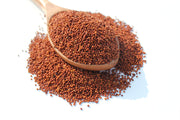Key Benefits
- Nutritional Value: Nutmeg is a good source of several important nutrients, including dietary fiber, manganese, copper, and vitamins such as vitamin B6 and vitamin C
- Digestive Health: Nutmeg has been used traditionally to aid digestion. It contains compounds that can help stimulate the digestive system, reduce
- Sleep Aid: Nutmeg may help induce sleep, improve sleep quality, and alleviate insomnia symptoms when consumed in moderation.
- Oral Health: It has been traditionally used to promote oral health, freshen breath, and relieve toothache or gum discomfort.
- Digestive Health: Nutmeg has been used traditionally to aid digestion. It contains compounds that can help stimulate the digestive system & reduce flatulence.
- Anti-inflammatory Properties: Nutmeg contains anti-inflammatory compounds such as myristicin and elemicin, which may help reduce inflammation in the body.
Organic Gyaan's Nutmeg Whole is a premium offering of the finest quality jaiphal (nutmeg) spices. Sourced from organic farms, these whole nutmegs are known for their superior flavour, aroma, and numerous health benefits. Nutmeg, derived from the seeds of the Myristica fragrans tree, has been cherished for centuries for its culinary and medicinal properties.
Organic Gyaan takes pride in providing customers with carefully selected nutmegs that are handpicked at the peak of ripeness. These jaiphal seeds are then sun-dried and packaged to preserve their freshness, ensuring that you receive the highest quality product.
Nutmeg whole is a versatile spice that can be used in various dishes and recipes. It adds a warm, slightly sweet, and nutty flavor to both sweet and savory dishes. Grating or grinding the whole nutmeg just before use ensures maximum aroma and taste, enhancing the overall culinary experience.
Apart from its culinary uses, nutmeg is also known for its potential health benefits. It contains compounds with anti-inflammatory, digestive, and cognitive-enhancing properties. Additionally, nutmeg has been traditionally used to promote oral health, induce sleep, and provide relief from pain.
Organic Gyaan's Nutmeg Whole is certified organic, ensuring that it is free from synthetic pesticides, fertilizers, and genetically modified organisms (GMOs). By choosing Organic Gyaan, you can trust that you are consuming a pure and natural product that supports sustainable agriculture and environmental conservation.
FAQs
1. What is nutmeg?
Nutmeg is a spice made from the seed of the Myristica fragrans tree, known for its warm and sweet flavour.
2. What are the health benefits of nutmeg?
Nutmeg may help with digestion, sleep, oral health, and has anti-inflammatory properties.
3. How can I use whole nutmeg?
You can grate or grind it and add to sweets, desserts, curries, or milk.
4. Is it safe to consume daily?
Yes, but in small amounts. Too much can cause side effects.
5. Is Organic Gyaan’s nutmeg organic?
Yes, it is 100% certified organic and free from chemicals or GMOs.
























